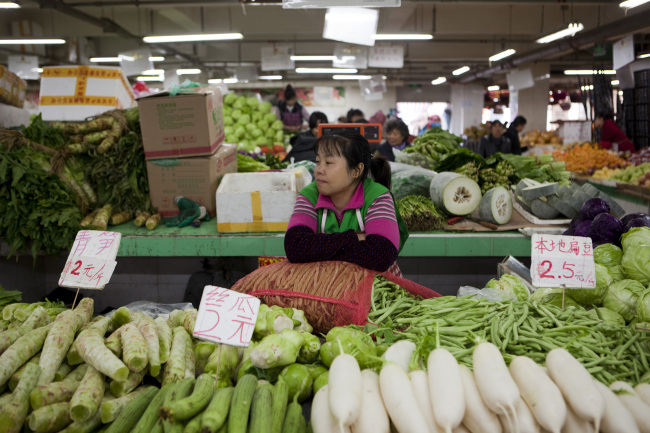China slowdown to bruise global economy
Economists forecast slowdown will cause global pain but leave U.S. relatively unhurt
By Korea HeraldPublished : Nov. 3, 2014 - 20:38
WASHINGTON (AP) ― China’s roaring economy for years has pulled much of the rest of the world with it, soaking up oil, iron ore and other commodities from developing countries and autos and luxury goods from Europe.
But its role as a global engine is fading as its economy slows ― and many other nations, in the view of economists, will feel the pain. An Associated Press survey of 30 economists has found that 57 percent of them expect China’s decelerating economy to restrain growth in countries from Brazil and Chile to Australia and South Korea.
A notable exception is the United States, which the economists see as largely insulated from China’s troubles.
China’s once-explosive growth has slowed in part because of its government’s efforts to restrain its speculative real estate sector and shift its economy toward consumer spending. China’s economy expanded 7.3 percent in the third quarter from a year earlier, its slowest pace since 2009. A growth rate above 7 percent would be the envy of most major economies. But for China, it marked a sharp slowdown after three decades of double-digit expansion.
But its role as a global engine is fading as its economy slows ― and many other nations, in the view of economists, will feel the pain. An Associated Press survey of 30 economists has found that 57 percent of them expect China’s decelerating economy to restrain growth in countries from Brazil and Chile to Australia and South Korea.
A notable exception is the United States, which the economists see as largely insulated from China’s troubles.
China’s once-explosive growth has slowed in part because of its government’s efforts to restrain its speculative real estate sector and shift its economy toward consumer spending. China’s economy expanded 7.3 percent in the third quarter from a year earlier, its slowest pace since 2009. A growth rate above 7 percent would be the envy of most major economies. But for China, it marked a sharp slowdown after three decades of double-digit expansion.

Last week, the Conference Board, a business group, forecast that China’s growth would slump to 4 percent by 2020.
China’s deceleration is rippling around the world. Brazil and Australia are selling it less iron ore, a key ingredient in steel, as China’s construction boom slows. Chile is exporting less copper to China. Indonesia is selling it less oil and lumber.
And South Korea’s electronics exports have faltered, hampering its growth, as Chinese consumers buy fewer smartphones or choose cheaper domestic alternatives.
China is also cracking down on corruption, which threatens European designer brands. Sung Won Sohn, an economist at California State University’s Smith School of Business, estimates that one-third of luxury Swiss watches are exported to China. In addition, China is the fastest-growing market for Mercedes-Benz and BMW.
U.S. automakers, particularly General Motors, also sell lots of cars in China. But nearly all are built in China and don’t contribute much to the U.S. economy, Sohn said. That’s true of many other U.S. goods sold in China, including electronics. As a result, weaker sales in China wouldn’t much hurt the United States. Capital Economics, a forecasting firm, calculates that only 6.5 percent of U.S. exports go to China ― equal to just 0.9 percent of the U.S. economy.
“It’s hard to see a slowdown in China having a really significant impact on the U.S. economy, barring a complete collapse,” said Paul Ashworth, an economist at Capital Economics.
-
Articles by Korea Herald



![[AtoZ Korean Mind] Does your job define who you are? Should it?](http://res.heraldm.com/phpwas/restmb_idxmake.php?idx=644&simg=/content/image/2024/05/06/20240506050099_0.jpg&u=)















![[K-pop's dilemma] Is Hybe-Ador conflict a case of growing pains?](http://res.heraldm.com/phpwas/restmb_idxmake.php?idx=642&simg=/content/image/2024/05/07/20240507050746_0.jpg&u=)